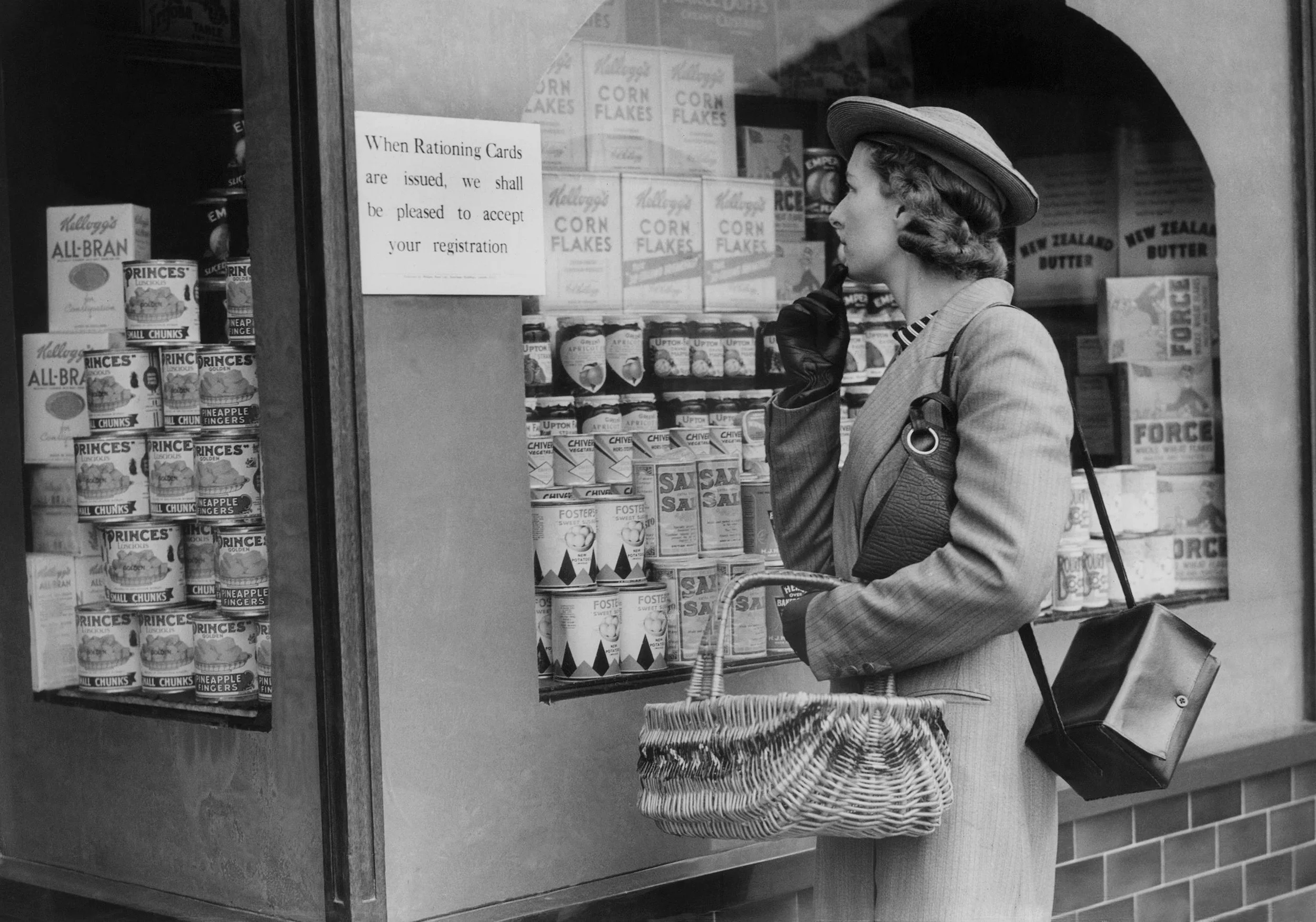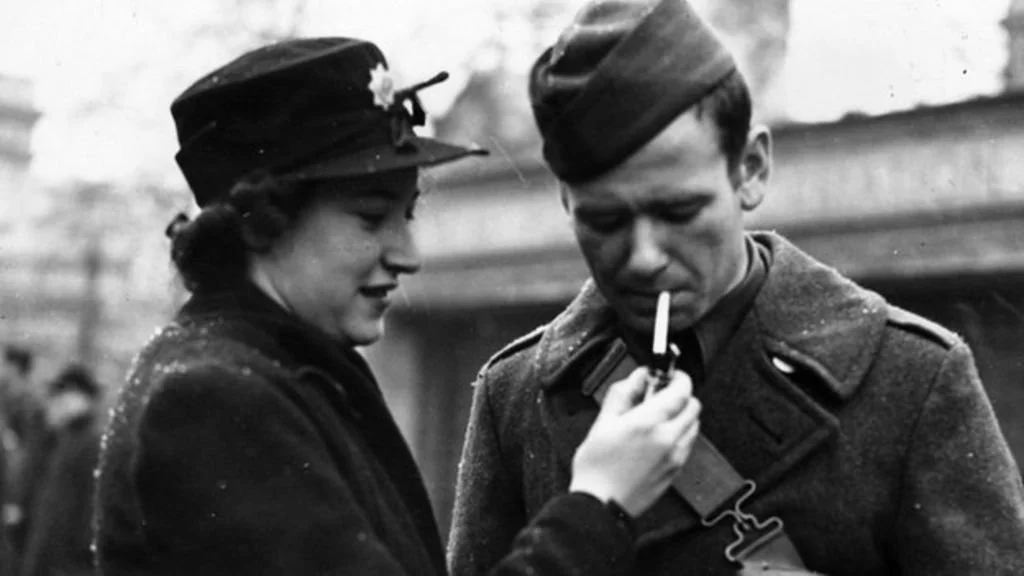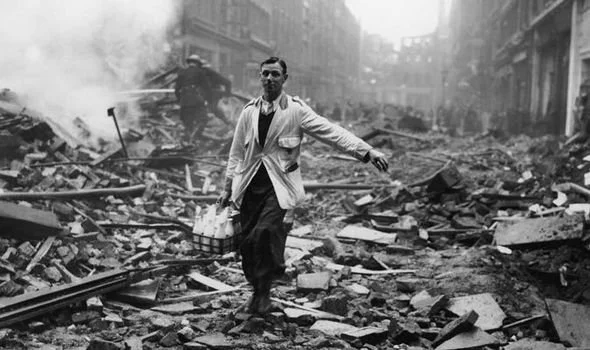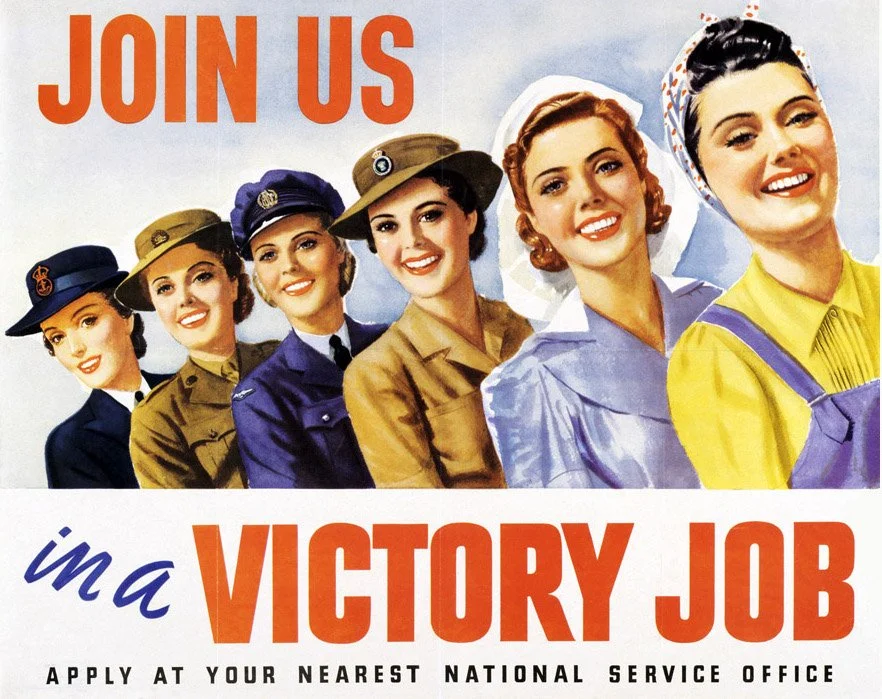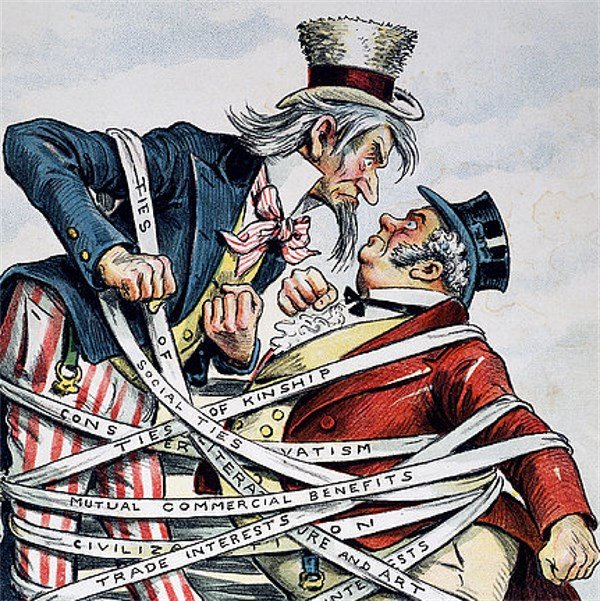The United States War Department: “The Brits are not panty-waists.”
“You will quickly discover differences [in the UK] that seem confusing and even wrong. Like driving on the left side of the road, and having money based on an “impossible” accounting system, and drinking warm beer. But once you get used to things like that, you will realise that they belong to England just as baseball and jazz and coca-cola belong to us.”
What a compliment! Contemporary myths are made in all kinds of ways, and more often than not there are kernels of truth in each one. This quote is from a document called “Instructions for American Servicemen in Britain 1942”, and was originally a pamphlet given to young American GIs in WWII, introducing them to the British allies they would be working with in the UK and Europe. It is extraordinarily amusing, and as a British guy who has lived all over the world, I can recognise a distinct checklist of conversational topics which non-Brits quiz me about - British food, British weather, British manners, British women, and of course, warm beer.
On a sunny day in Daejeon, 2014, one PhD scientist in Korea (yes, I’m looking at you Junsun) asked me about the traditional British cuisine of the “toast sandwich”, which he described as a staple of the British diet lol. It apparently consisted of a piece of toast nestled between two slices of bread - butter and salt optional… well to me that sounds like a flavour overload! As a product of the empire, the range and quality of food available in most British cities now far outweighs that of many other countries I’ve lived in, especially Korea (controversial content!) - but somehow the myth of the “toast sandwich” persists - and a lot of the stereotypes of the British come from Wartime relations. On reflection, it’s probably because our traditional cuisine has kind of taken a back-seat, and largely disappeared - which is fine because I wasn’t a big fan hahahaha. Although I do like pies and stews and roast dinners and pudding… actually maybe I am a fan.
Anyway, having just arrived in Manchester, New Hampshire (U.S.), I am beginning to organise my thoughts on the artwork I will make here - and a good starting point is the British-American relationship. As with every project, I usually do a huge amount of research into the location, subject and background of my piece. For example, when creating Power from the Blazing Stone, I read endless papers and watched many hours of lectures and documentaries on the process of lithium extraction, the cultural and environmental implications of this process - and was particularly interested in the USP of my clients (a Cornish Lithium mine), with whom I spent 10 days. Similarly, when creating Walking on the Sea with my art studio The Bite Back Movement, I lived in a fishing village in S. Korea, on an island of 50 people for 10 days whilst a national TV channel broadcast a 4 part series on us. Now, after 2 weeks of isolation in Brighton, I gathered up my library of Covid-19 documents and 200,000 teabags, and embarked on a 30 hour journey to Boston. During this time I began reading a number of things to fuel my imagination and get me started; “Sapiens”, “American Gods”, “Manchester Ghosts”, “How to Hide an Empire”, and “Instructions for American Servicemen in Britain 1942.” The latter was Government issued in the 1940s, but so colloquial that it sounds like a friend chatting to you. It really illustrates the divergence of British and American cultures and caught my imagination. It begins:
“You are going to Great Britain as part of an Allied offensive - to meet Hitler and beat him on his own ground. For the time being you will be Britain’s guest. The purpose of this guide is to start getting you acquainted with the British, their country, and their ways.”
I picked this up from the bookshop my friend John manages, and thought it would be enlightening (and funny) to read as a kind of reversal of roles from what my Grandparents experienced - a British guy going to the US. It goes through sections like “DON’T BE A SHOWOFF”, “BRITISH RESERVED, NOT UNFRIENDLY”, “BRITISH WOMEN AT WAR”, and the comparatively less spicy; “THE BRITISH LIKE SPORTS”. The document basically outlines what the Americans thought of the British at the time, and explains how they should have behaved in the 1940s UK; this included tips on pub etiquette, how to handle mixed race public transport, and urging the Irish-Americans not to beat the shit out of the English as payback for their history of persecution. This final point was so important that it is literally the first section of the text, entitled “NO TIME TO FIGHT OLD WARS”.
The piece begins by outlining the similarities between the US and UK, such as our language, a shared belief in representative government, the freedoms of worship and speech, but goes on to explain that there are also vast differences between our cultures. It explains that Hitler would try to exploit these differences, sewing seeds of division to weaken unity between the allies. The writing urges Americans to set aside their “Grandfather’s grievances” and forgive the “Redcoats” for the Empire and civil war, and for the persecution of the Irish over generations. It reads:
“You defeat enemy propaganda not by denying that these differences exist, but by admitting them openly and trying to understand them.”
After so many years of divisive Trump and Boris rhetoric, it’s really refreshing to read sentiments of unity in this regard - even if it did take literally two world wars to achieve it lol. However, probably the most amusing parts are the little digs and insinuations about the British, for example, the colloquial discussions of “bigger” things versus “smaller” things, or decimal versus metric, or introvert versus extrovert:
“British money is in pounds, shillings and pence. The British are used to this system and they like it, and all your arguments that the American decimal system is better wont convince them. They won't be pleased to hear you call it “funny money”, either. They sweat hard to get it (wages are much lower in Britain than America) and they won’t think you smart or funny for mocking it at all.”
There are moments when it actually begins to sound like a willy measuring contest:
“You will find that the British care little about size, not having the “biggest” of many things as we do.”
Extrovert cultural trends versus introvert cultural trends, bragging, and respecting personal space are discussed a lot. These are truly some of the gems of the pamphlet. The irony is that it simultaneously instructs the American GIs not to brag, whilst bragging about wages, values, the scale of things, even features of the natural landscape:
“You will find out right away that England is a small country, smaller than North Carolina or Iowa… England’s largest river, the Thames (pronounced “Tems”) is not even as big as the Mississippi when it leaves Minnesota.”
“DON'T BE A SHOWOFF. The British dislike bragging and showing off. American wages and American soldier’s pay are the highest in the world… The British “Tommy” is apt to be specifically touchy about the difference between his wages and yours.”
So clearly not much has changed with British wages in the past few decades then. But aside from predicting how the Americans may offend the Brits, it also goes the other way. Some parts of the text seem almost like a parent reassuring a child on the first day of school:
“On a small crowded island where forty-five million people live, each [British] man learns to guard his privacy carefully - and is equally careful not to invade another man’s privacy. So if Britons sit in trains or buses without striking up conversation with you, it doesn’t mean they are being haughty or unfriendly. Probably they are paying more attention to you than you think.”
The discussion of language also makes me laugh:
“Another difference. The British have phrases and colloquialisms of their own that may sound funny to you. You can make just as many boners in their eyes. It isn’t a good idea, for instance, to say “bloody” in mixed company in Britain - it is one of their worst swear words. To say ‘I look like a bum’ is offensive to their ears, for to the British this means that you look like your own backside.”
Yes, don’t say the word “bloody” in front of the ladies. But the word “boner” is fine, especially in our eyes.
There are also many complementary and sympathetic parts in the text, which are scattered throughout. But perhaps the most evocative lines in the text are about the suffering and deprivation experienced by the British during the war, and the embarrassment of my Grandparents’ generation to have foreigners observe it:
“Britain may look a little shop-worn and grimy to you. The British people are anxious to have you know that you are not seeing their country at its best. There’s been a war on since 1939.”
“THE BRITISH ARE TOUGH. Don’t be misled by the British tendency to be soft-spoken and polite. If they need to be, they can be plenty tough. The English language didn’t spread across the oceans and over the mountains and jungles and swamps of the world because these people were panty-waists.”
Clearly this pamphlet was a product of its time, so the celebration of colonisation and Empire was common back then - luckily we now know that there is great shame in the atrocities expedited under the umbrella of Empire, and something that should be analysed and never repeated.
I have a particular interest in monarchy, so for me the discussion of British democracy is interesting. There are a lot of mental gymnastics needed to understand how the British can call the UK a genuine democracy with all its conquered territories, heraldic positions and inequities, but this pamphlet takes a good stab:
“Although you’ll read in the papers about “lords” and “sirs”, England is still one of the greatest democracies… Personal rule by the king has been dead in England for nearly a thousand years… The British people have great affection for their monarch but they have stripped him of practically all political power… Many of the “titles” held in the lords (such as “baron” and “duke” and “earl”) have been passed from father to son for hundreds of years… these customs may seem strange and old fashioned but they give the British the same feeling of security and comfort that many get from the familiar ritual of the church service.”
Yes, don’t look at the monarchs draped in gold and diamonds, living in literal castles, or the dukes and earls who inherit their titles from birth and get to steer the “democratic” process. That’s all just pageantry, and the whole thing feels like a nice warm hug and a cup of tea. This topic is where the book “Sapiens” really comes into its own, but that’s a subject for another post.
The discussion of sport is also interesting, it kind of makes the British sportspeople seem like children playing at a birthday party, with the spectators as sympathetic parents - whereas the American equivalent is quite aggressive and severe:
“If a fielder misses a catch at cricket, the crowd will probably take a sympathetic attitude. They will shout “good try” even if it looks to you like a bad fumble. In America the crowd would probably shout “take him out”... In general more people play games in Britain than in America and they play the game even if they are not good at it.”
For some reason they keep calling rugby “Rugger”, was that a thing?
Parts of the text are actually incredibly touching and make me feel a little emotional about what my grandparent’s generation went through during WWII. In a section called “THE BRITISH CAME THROUGH” the struggles and deprivations of wartime are described:
“The British have been bombed, night after night, month after month. Thousands of them have lost their houses, their possessions, their families… You are coming to Britain from a country where your home is still safe, food is still plentiful, and lights are still burning… So stop and think before you sound off about lukewarm beer, or cold boiled potatoes, or the way English cigarettes taste.”
Passages like this certainly give me moments of reflection. If we could have this same attitude of compassion and solidarity in contemporary life, then perhaps we would treat refugees from war-torn countries with more understanding and compassion. It’s easy to forget the extremes of survival which others have had to endure.
Many things changed in the UK because of the World Wars, and in particular the role of women in the war effort needed to be explained to the U.S. soldiers. It was only a recent development that women could be seen in positions of authority in a military setting. This really makes the mind boggle, when you imagine how recently women have been able to push for equal rights - still with a long way to go! It is also incredibly touching:
“A British women officer or non-commissioned officer can - and often does - give orders to a man Private. The men obey smartly and know it is no shame. For British women have proven themselves in this way. They have stuck to their posts near burning ammunition dumps, delivered messages afoot after their motorcycles have been blasted from under them. They have pulled aviators from burning planes. They have died at the gun posts and as they fell another girl has stepped into the position and “carried on”. There is not a single record in this war of any British woman in uniformed service quitting her post or failing in her duty under fire. Now you understand why British soldiers respect the women in uniform. They have won the right to the utmost respect. When you see a girl in khaki or air-force blue with a bit of ribbon on her tunic - remember she didn't get it for knitting more socks than anyone else in Ipswich.”
The last part could have been phrased better. Also, why give a shoutout to Ipswich? That would have certainly annoyed all the Norwich-folk.
The pamphlet ends on a number of bullet points with some sound advice for anyone in any situation:
“You can understand that two acts on your part will slow up the friendship - swiping his girl, and not appreciating what his army has been up against. Yes, and rubbing it in that you are better paid than he is.”
“The British don’t know how to make a good cup of coffee. You don’t know how to make a good cup of tea. It’s an even swap.”
(Amen!)
“Don't make fun of British speech or accents. You sound just as funny to them but they will be too polite to show it.”
I found the whole thing to be pretty endearing and at times quite touching. Yes, it is problematic throughout, but what wasn’t problematic in the 1940s? This document is really about extending compassion to allies who were formally seen as enemies. It is also clear to see how some of the stereotypes of the British were formed at this time, when a great mass of Americans were seeing the UK for the first time. It’s very odd to think that this document was about my grandparents and all the things they went through during WWII - and it somehow humanises the British of this time better than most other accounts I have read or seen. I do not know how this will feed into my project yet - but I’ve certainly had a good laugh over it with some new American friends - so it’s clearly still working!


